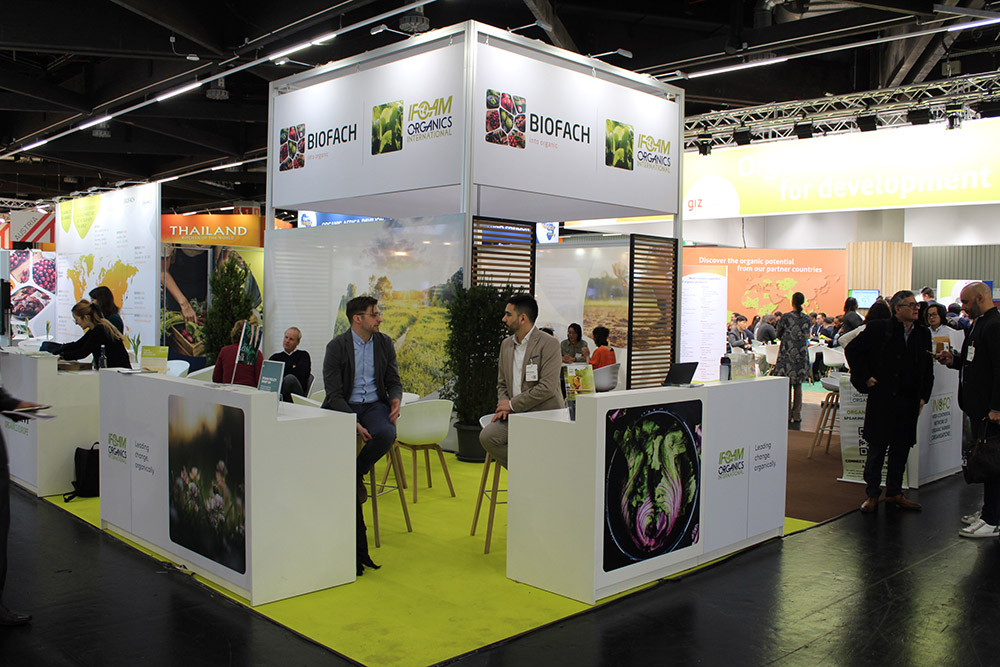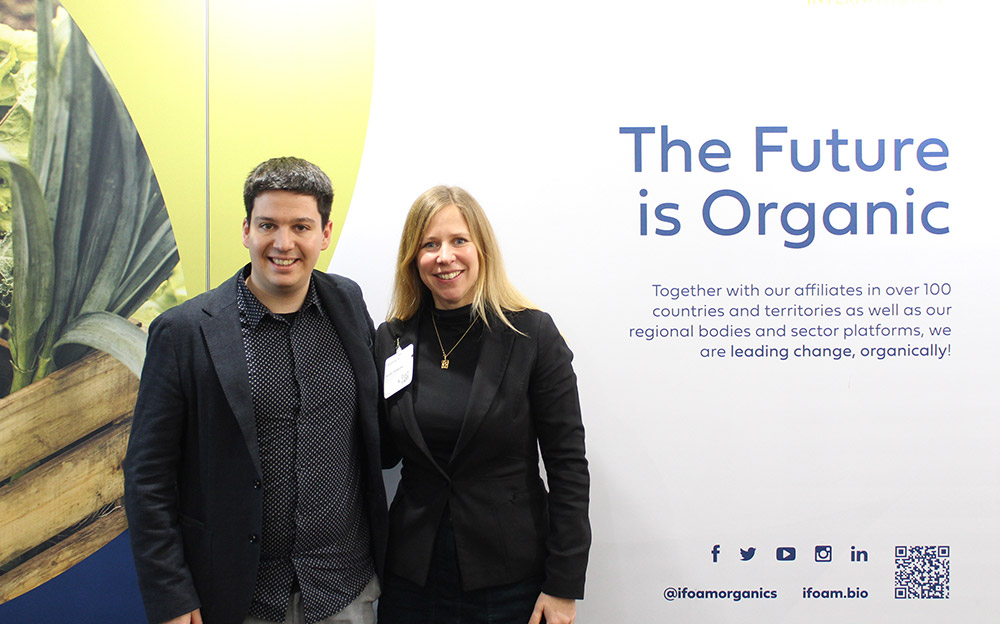
Sarah Compson (IFOAM Organics International): «It is important to design systems in which farmers are at the centre»

Sarah Compson is the Standards Innovation Director at Soil Association. With nearly 20 years’ experience in the organic sector, she has detailed knowledge on a range of topics from food and farming standards to textiles. Sarah is particularly involved with IFOAM Organics International– the umbrella organisation for the organic movement, of which she is a member of the World Board.

On December 6, 2024, the General Assembly of IFOAM – Organics International approved the statement «Elevating Truly Regenerative Agriculture – Statement from the Organic Movement» in Taiwan, which provides members, partners and regenerative actors with valuable perspectives from the organic movement on current regenerative initiatives and claims to inspire thought and action.
Regenerative and organic: what does IFOAM stand for?
The statement approved by members of IFOAM Organics International ‘Elevating Truly Regenerative Agriculture – A Statement from the Organic Movement’ is a landmark moment for our movement – marking an important starting point for how the organic movement can and should position itself in relation to regenerative agriculture. It recognizes organic as being at the heart of regenerative and encourages the organic sector to collaborate with serious regenerative actors. It also affirms, with confidence, the important role that organic plays in providing a platform for policy makers and consumers alike to support regenerative ambitions. However, the statement also recognizes the risks arising from the cynical use of the term ‘regenerative’ by some actors looking to repackage business as usual rather than drive the transformative solutions that the world so badly needs. We’re beyond the point where intention is enough – action is needed.
And there’s no oversight on regenerative claims.
Exactly. Legislators are lagging behind in addressing greenwashing, though in some cases, they are catching up. For instance, in the UK, our Advertising Standards Authority has issued guidelines on making a «regenerative» claim. What do you need to bear in mind? The main thing is substantiation. If you’re going to say you are regenerative, you need to define what that means for you and demonstrate how you will achieve it.
«Transparency and information are really key so that consumers can make informed choices»
How does this translate in the UK? If a company has a product and they want to make a «regenerative» claim?
So far the claim hasn’t been tested by law in the UK, but we’re aware that’s started to happen in other jurisdictions. But serious regenerative actors will react appropriately because they want to ensure that they have regenerative impacts themselves. So, they’ll want to set targets and implement systems for monitoring and measuring their progress, which should definitely be welcomed. The organic sector has a lot to gain by considering ways that practices can be measured and improved for positive impact – this is an area where greater collaboration between our movements are really welcomed.

©Bio Eco Actual. IFOAM Organics International booth at BIOFACH 2025
Regarding how this might impact consumers and retailers, what should sales channels keep in mind?
Transparency is really important for consumers. That’s why the organic system of guarantee and whole supply chain assurance is so beneficial. The fact it’s also enshrined in law is also a big advantage in terms of substantiating claims. Organic standards being enshrined in law was a huge win for the organic movement. We think that transparency and clear information are really key so that consumers can make informed choices.
Where do you see the strongest narrative, movement, or industry? Is it in the US?
The rise of the regenerative movement has certainly come from the US in response to various issues there, including deficiencies in the organic regulation which cause ongoing frustration as the organic regulatory baseline has strayed somewhat from the principles of the organic movement.
«It’s frustrating how the narrative is sometimes twisted to suggest that organic farming is ‘inflexible and rules-based’ when, in reality, it is principles-based and holistic»
An ongoing frustration for me is how organic is sometimes mischaracterized by regenerative proponents as only being a set of rigid rules, while regenerative agriculture goes above and beyond. It’s a false comparison to take the regulatory baseline of one sector and compare it to the aspirations of another. Organic does have a baseline rules—but they are a floor, not a ceiling, and the organic movement’s narrative is just as compelling and aspirational (and to a large extent aligned!) as the regenerative movement’s. It’s frustrating how the narrative is sometimes twisted to suggest that organic farming is «inflexible and rules-based» when, in reality, it is principles-based and holistic.
Right now, in Spain, Catalonia wants to implement a new sustainability seal, but the approach is problematic, like the Haute Valeur Environnementale in France.
The regenerative movement is doing a great job of helping farmers innovate and adapt their systems. The organic sector can take inspiration from this. However, when it comes to market positioning, things get confusing. Ultimately we must avoid competing market claims that risk distracting from transformative solutions that we urgently need to urgently address the climate and environmental crises.
Organic is by far the leading claim when it comes to sustainability and ecological protection and climate adaptation. Organic certification and standards are a tool to drive impact. When new sustainability claims enter the same market and compete for the same consumers, there’s a risk of slowing down progress rather than accelerating it. There are loads of things that can be done that aren’t market pull factors, but push factors. But we need to address the fact that we’re not getting some fundamental things right. We are thinking about value in terms of economic return on investment, when we should be considering economic returns within the context of environmental sustainability.
«We are thinking about value in terms of economic return on investment, when we should be considering economic returns within the context of environmental sustainability»
That’s where the regenerative movement and sustainability reporting can add value. In many ways, the organic sector has been calling for true cost accounting for years. Now, we have an opportunity to co-create sustainability metrics and monitoring systems that reflect some of the values of the organic sector. Of course, there are risks, because organic farming can’t be reduced to a handful of metrics, just as it can’t be reduced to a simple set of standards. There will always be compromises, but as long as we stay focused on the bigger picture—driving meaningful change—we have great opportunities ahead.
What is the sustainability reporting you were just mentioning?
There are growing calls, both by law makers and industry to report on sustainability impacts. For example the CSRD. That is the Corporate Sustainability Reporting Directive, These sustainability reporting framework call for metrics related to things like carbon, water and biodiversity. Even though the UK is outside of the EU, lots of companies also want to be able to report how they are delivering against certain key environmental indicators. The challenge with that is that there’s not a unified methodologies for assessing these impacts and there are also risks around taking a reductionist and narrow approach – e.g. carbon tunnel vision. IFOAM has a key role to play in setting out both the risks and also opportunities for good systems of sustainability reporting.
And what do you stand for within this sustainability reporting?
We want the organic sector to help shape what this sustainability reporting should look like. The sector is leading in this field. We know how to think about environmental systems within a business and trade context. Sustainability reporting should take as holistic and broad a view as possible.

©Bio Eco Actual. Sarah Compson (IFOAM Organics International) and Oriol Urrutia (Bio Eco Actual) at BIOFACH 2025.
Farmers should be central to the design and should benefit from this. They need information that’s going to be helpful to them as well as valuable to shareholders. Technology works best when you do it with farmers. So, farmers will get involved in analyzing their soils and they will be part of assessing the biodiversity on their farms so that they can see the results and feel part of not only the data collected on their farms, but also be motivated to make changes and see that it will benefit them and the productivity and profitability of their farm systems. We also don’t want these reporting systems to become something that is another burden in terms of time and cost. So, designing systems with farmers at the centre is really important. And then also collectively working as a sector to develop metrics and an approach to sustainability reporting that works for our sector.
In many ways, it’s a bit like when we developed the organic standards. At the beginning, people were in different places developing organic standards, and then we came together. That’s the role of organizations like IFOAM, to act as an umbrella to bring these diverse conversations together and get people in the room to figure out the difficult things and to come up with something that works for everyone.
At the same time, the organic movement is usually very Eurocentric. What about Africa, Asia, or South America?
At the Organic World Congress in Taiwan, we had the valuable opportunity to have people in the same room from all over the world – not just the global North. Together we were able to shape a global perspective on the issues or organic and regenerative as well as sustainability reporting. It was just so valuable to have different perspectives. It’s also so important that farmers are involved and that we can have open and honest conversations about decolonizing our food systems. We mustn’t impose sets of requirements from the global North on the global South. Designing systems that work for everyone is also really important.
«We also need to decolonize certification systems and our approach to agricultural supply chain»
Attributes like «natural», «vegan» and «free-from» often compete with organic. How has the market in the UK managed to address this challenge?
The latest market figures are good for the UK, with the organic market increasing in both value and volume. The market is doing well, which is great to see, given inflationary pressures and a lot of the challenges that we’ve seen across the European markets.
As far as possible, we try to align so that vegan products are also organic, vegan consumers often have values that have strong alignment with the organic market. We don’t see ourselves as competing with those markets, but rather as natural allies.
Author: Oriol Urrutia, Bio Eco Actual Co-Editor
Subscribe to Bio Eco Actual Newsletter and be up to date with the latest news from the Organic Sector
Bio Eco Actual, International Organic Newspaper
@BIOFACH CHINA 2026
亚洲国际有机产品博览会
2026年5月18日-20日,上海新国际博览中心E6馆
更多优质有机好物,等您来发现





